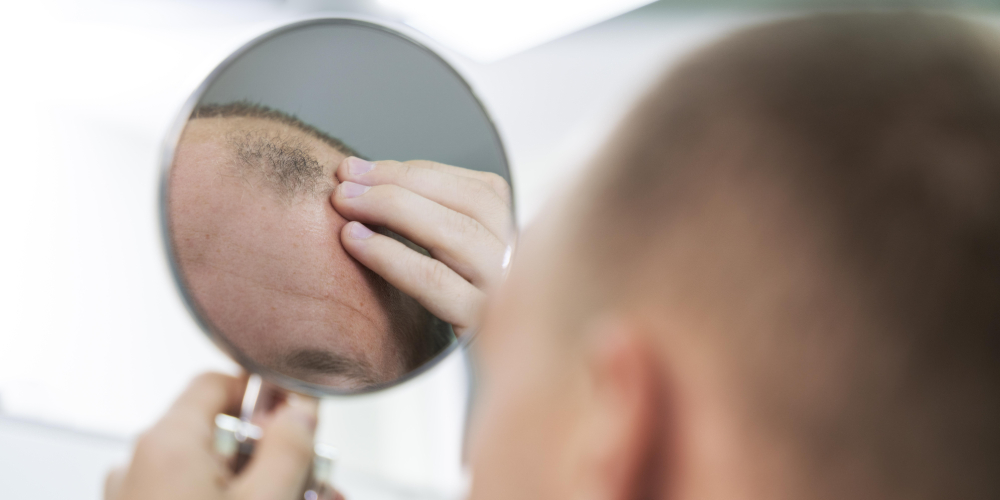
Can Smoking or Vaping Cause Hair Loss?
We all want healthy, full hair, but what if your daily habits were secretly working against you? Smoking and vaping, known for their harmful effects on the lungs and heart, might also be impacting your hair. Yes, those habits you turn to for stress relief could be contributing to thinning hair or even hair loss.
Picture this: You’re doing everything right with your haircare routine, using the best products, and yet, your hair seems to be thinning. Could it be the cigarettes or the vape you turn to when stressed? The reality is that smoking and vaping don’t just affect your internal health, they can also damage your hair.
In this article, we’ll explore how smoking and vaping can lead to hair loss, backed by research and science. You’ll learn about the biological processes involved and what you can do to protect your hair. If you’ve been wondering whether your smoking or vaping habits might be the reason behind your thinning hair, keep reading to find out.
The Basics: How Hair Growth Works
Before we delve into the effects of smoking and vaping, it’s important to understand how hair growth works. Your hair grows from follicles, which are tiny sacs located just beneath the surface of your scalp. Each hair follicle goes through a cycle of growth (anagen phase), transition (catagen phase), and rest (telogen phase) before it eventually falls out and new hair begins to grow.
Healthy hair growth relies on a steady supply of nutrients, oxygen, and proper blood circulation to the scalp. Any disruption to this delicate balance can lead to hair problems, including thinning, breakage, or even hair loss.
Smoking and Hair Loss: Is There a Connection?
It’s no secret that smoking is bad for your health. But how exactly does it relate to hair loss? Here are a few ways smoking could be contributing to thinning hair:
1. Reduced Blood Flow to Hair Follicles
One of the most significant impacts of smoking is on your circulatory system. Smoking constricts blood vessels, reducing the amount of blood that can flow to various parts of your body, including your scalp. Hair follicles rely on a rich blood supply to receive oxygen and nutrients. When this supply is compromised, it can weaken the follicles and lead to hair thinning or even hair loss.
A study published in the Journal of Dermatological Science found that smoking can impair blood flow to the scalp, which in turn can negatively impact hair growth. The reduced circulation deprives hair follicles of essential nutrients, making it harder for them to produce healthy hair.
2. Oxidative Stress and Free Radicals
Smoking introduces a significant number of toxins and free radicals into your body. These harmful substances can cause oxidative stress, which damages cells and accelerates the aging process. Your hair follicles are not immune to this damage.
Oxidative stress can weaken hair follicles, disrupt the hair growth cycle, and lead to premature hair loss. A study in the International Journal of Trichology highlighted the connection between oxidative stress and hair loss, noting that smokers may experience more pronounced thinning and balding compared to non-smokers.
3. DNA Damage in Hair Follicles
The chemicals in cigarettes, such as nicotine, tar, and formaldehyde, can cause direct damage to the DNA in your hair follicles. This damage can affect the normal functioning of the follicles, leading to irregular hair growth patterns and increased hair shedding.
Research published in PLOS ONE demonstrated that smoking can cause DNA damage in various tissues, including hair follicles. This damage could be a contributing factor to smoking-related hair loss.
4. Hormonal Imbalance
Smoking has been shown to interfere with the body’s hormonal balance, particularly the production of hormones like estrogen and androgens. These hormones play a crucial role in hair growth, and any imbalance can result in hair loss.
For example, a study published in the Journal of Cosmetic Dermatology found that smoking could increase the levels of certain androgens in the body, which are linked to male and female pattern baldness. This hormonal imbalance might be one reason why smokers are more prone to hair thinning and loss.
Vaping and Hair Loss: Is It Any Better?
Vaping has been marketed as a safer alternative to smoking, but does that mean it’s safe for your hair? The answer isn’t straightforward. While vaping doesn’t expose you to all the harmful chemicals found in cigarettes, it still comes with its own set of risks.
1. Nicotine’s Role in Hair Loss
Like smoking, many vaping products contain nicotine, which is known to have negative effects on hair health. Nicotine constricts blood vessels, reducing blood flow to the hair follicles, just as it does in smokers. This reduced circulation can starve the follicles of essential nutrients, leading to weakened hair and increased shedding.
Moreover, a study in the American Journal of Pathology found that nicotine can disrupt the normal hair growth cycle, causing hair to enter the resting phase prematurely. This disruption can lead to more hair falling out and slower regrowth.
2. Inflammation and Scalp Health
Vaping liquids often contain various chemicals, including propylene glycol and vegetable glycerin, which can cause inflammation when inhaled. Chronic inflammation can affect the scalp’s health, leading to conditions like dandruff, dermatitis, and ultimately, hair loss.
A study published in the Journal of Investigative Dermatology pointed out that inflammation of the scalp could lead to follicle damage and hair thinning. Vaping, with its potential to cause inflammatory responses, may thus contribute to poor scalp health and hair loss.
3. Dehydration and Hair Dryness
One of the lesser-known side effects of vaping is dehydration. The chemicals in e-liquids, particularly propylene glycol, can cause your body to lose moisture, leading to dry skin and hair. Dry hair is more prone to breakage and split ends, which can make it appear thinner over time.
A study in Clinical, Cosmetic, and Investigational Dermatology highlighted the importance of moisture for hair health, noting that dehydration can weaken hair shafts and lead to increased breakage. If you’re an avid vaper, you might find your hair becoming drier and more brittle, which can contribute to hair thinning.
How to Protect Your Hair
If you’re concerned about the impact of smoking or vaping on your hair, the best course of action is to quit. Easier said than done, right? Quitting smoking or vaping can be challenging, but it’s one of the best things you can do for your overall health, including your hair.
1. Quitting Smoking or Vaping
The first step in protecting your hair is to quit smoking or vaping. This can be difficult, but there are plenty of resources available to help you. Nicotine replacement therapies, counseling, and support groups can all be effective tools in your journey to quit.
A study in the New England Journal of Medicine found that individuals who quit smoking experienced improvements in hair growth over time, as their bodies began to repair the damage caused by years of tobacco use.
2. Improving Your Diet
A healthy diet is crucial for hair growth. Foods rich in vitamins, minerals, and antioxidants can help nourish your hair from the inside out. Prioritize a balanced diet rich in fruits, vegetables, lean proteins, and whole grains.
Specifically, vitamins like biotin, vitamin E, and vitamin C are known to promote healthy hair growth. Research published in Dermatologic Therapy suggests that a diet rich in these nutrients can improve hair density and strength.
3. Boosting Blood Circulation
Improving blood circulation to your scalp can help support healthy hair growth. Regular exercise, scalp massages, and using products that stimulate blood flow can all be beneficial.
A study in Skin Pharmacology and Physiology found that scalp massages can increase hair thickness and strength by boosting blood flow to the hair follicles.
4. Reducing Stress
Stress is a known contributor to hair loss, and both smoking and vaping can exacerbate stress levels. Finding ways to manage stress, such as through mindfulness, yoga, or regular physical activity, can help protect your hair from the negative effects of stress.
Research in the Journal of the American Academy of Dermatology found that stress-related hair loss can be mitigated by reducing stress levels and practicing relaxation techniques.
Final Thoughts: Is It Time to Kick the Habit?
While more research is needed to fully understand the impact of vaping on hair loss, the evidence suggests that both smoking and vaping can contribute to thinning hair. The good news is that by quitting these habits and adopting a healthier lifestyle, you can protect your hair and promote new growth.
Keep in mind that your hair mirrors your overall health. Taking steps to quit smoking or vaping, eating a nutritious diet, and managing stress can not only improve your hair’s appearance but also enhance your overall well-being.
So, if you’ve been wondering whether smoking or vaping could be causing your hair to thin, the answer is likely yes. But it’s never too late to make a change.




